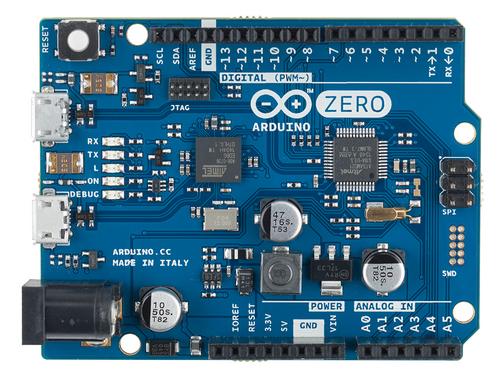Jointly developed by Atmel and Arduino, Arduino introduces Arduino Zero; a 32-bit evolution, powering the next generation of IoT development
It’s a pleasure to announce the latest development board, Arduino Zero, expanding the Arduino family by providing increased creative opportunities to the maker community.
Arduino and Atmel unveil the Arduino Zero, a simple and powerful 32-bit extension of the platform established by Arduino UNO. It aims to provide creative individuals with the potential to realize truly innovative ideas especially for smart IoT devices, wearable technology, high-tech automation, crazy robotics, and projects not yet imagined.

The board is powered by Atmel’s SAMD21 MCU, which features a 32-bit ARM Cortex M0+ core and one of its most important feature is Atmel’s Embedded Debugger (EDBG), which provides a full debug interface without the need for additional hardware, significantly increasing the ease-of-use for software debugging. EDBG also supports a virtual COM port that can be used for device programming and traditional Arduino boot loader functionality.
Massimo Banzi, Arduino co-founder and CEO said: “The flexible feature set enables endless project opportunities for devices and acts as a great educational tool for learning about 32-bit application development.”
Reza Kazerounian, senior vice president and general manager, microcontroller business unit at Atmel added: “Leveraging more than 15 years of experience since the inception of AVR, simplicity and ease-of-use have been at the core of Atmel’s technology, Atmel is pleased to see the continued growth of the global maker community stemming from the increasing access and availability to open source platforms such as Arduino. We enable makers, but the power lies within the makers themselves.”
Summary
- Microcontroller ATSAMD21G18, 48 pins LQFP
- Operating Voltage 3.3 V
- Digital I/O Pins 14, with 12 PWM and UART
- Analog Input Pins 6, including 5 12bits ADC channels and one 10 bits DAC
- DC Current per I/O Pin 7 mA
- Flash Memory 256 KB
- SRAM 32 KB
- EEPROM up to 16KB by emulation
- Clock Speed 48 MHz